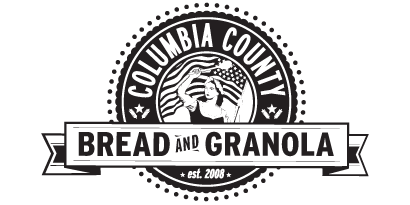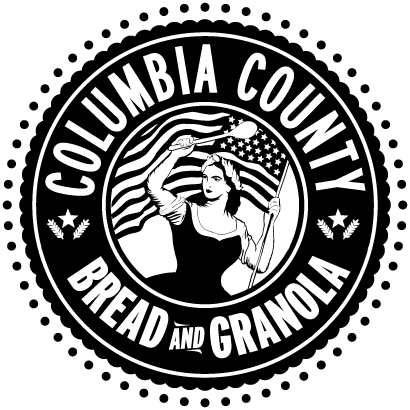Frequently Asked Questions

-
Are your products certified organic?
We source mainly certified organic ingredients such as oats, chocolate, cranberries, blueberries, raisins, and most of our seeds and grains, however, we have found that sourcing from a certified organic grower may not necessarily mean the best possible ingredient. When we can (apples, honey, grains, etc), we like to buy direct from our local farmers whom we have come to know and trust thru various farm markets and agricultural symposiums we attend. These are family owned farms and orchards dedicated to preserving the integrity of their soil and the nutrient density of their produce. Organic certification is an intense process steeped in paperwork and a minutia of compliances that favor large industrial farm operations. Whenever we visit the farmers in our network, we recognize that their processes and care for their land meets or exceeds certified organic standards.
Are your products certified GMO free?We self-certify - we verify before we buy that we are NOT sourcing anything that may be GMO. If there is any doubt, we source elsewhere. A case in point, Ocean Spray "Craisins" are a very popular sweetened cranberry but when Ocean Spray refused to divulge if their sugar was GMO or not, we immediately went looking for a better dried cranberry and found a source for organic cranberries out of New Jersey.
Why aren't you certified NON-GMO through a trusted certifying agency?I imagine there are good, reputable companies who are in business of certifying NON-GMO status for food manufacturers. However, I find the NON-GMO certification process to be problematic. The problem is a conflict of interest because these certifying agencies make their money from the fact that the USA does NOT require GMO labeling. We need transparency in our food supply in this country which is why we STRONGLY support GMO labeling at the federal level. However, if that were to happen, these NON-GMO certifying agencies would go out of business. Therefore, what possible motivation do they have to change things from the status quo?
Your breads and granolas are expensive. Why?We are dedicated to an employee-centric workplace meaning that our products are made by hand not machinery. We employ skilled bakers who are paid accordingly. We stress safety and high sanitation standards in our workplace but we also highly encourage a congenial, creative, stress reducing work environment. We are on the path to becoming a "Benefits" corporation meaning that our high standards will soon be codified into our corporate bylaws. These standards include a path to employee ownership, sustainable practices, low carbon footprint and community involvement.
I would like to see my favorite local health food store carry your products. What can I do?Contact DougCCBG@gmail.com and we would be very happy to see if we can make that happen. Thanks, Doug
-
Are flax seeds really as good for you as you say they are?
Yes. They are. The benefits of incorporating flax into your diet has been widely documented. Flax continues to top the list as one of nature’s original superfoods. The following links can take you directly to websites that reveal how eating flax can actually help prevent cancer, alzheimers and irritable bowel, inflammation and better cognitive skills with the clinical research that proves it…
Cancer prevention…
http://www.aicr.org/foods-that-fight-cancer/flaxseed.html http://www.cancer.org/cancer/prostatecancer/detailedguide/prostate-cancer-new-research
Alzheimer's prevention...
http://www.webmd.com/alzheimers/news/20120502/fish-flaxseed-may-lower-alzheimers-risk
Inflammation and other digestive benefits...
http://www.onegreenplanet.org/natural-health/flax-seeds-and-health-ailments/
Brain health (this is mostly about fish oil, but it talks about omega 3s):
http://www.naturalnews.com/016353_omega-3_fatty_acids_mental_health.html
I’ve heard that flax should be milled or ground before being eaten.Not only is this NOT true, it’s actually a terrible idea. Flax is packed with anti-oxidants and inflammation-fighting omega 3 fatty acids. Though incredibly beneficial, the nutrients in flax degrade rapidly once ground or milled which renders most every product containing ground or milled flax seed as offering little to no benefit from flax’s natural nutrient density. We say, the best way to grind or mill flax is with your teeth. Chew your flax granola thoroughly and you will get the maximum benefit of all that flax has to offer.
The package says the flax is “activated”. What does that mean?We are big proponents of preparing seeds and grains for digestion. This is why we make our breads with sprouted grain, forgoing flour and yeast. With flax, we soak the flax seeds 24 hours, long enough to signal to the seed that it is ready to germinate (come to life). In another 18 to 24 hours, the seed would sprout, sending a visible if tiny root structure out into the world. We do not want to wait for the flax seed to sprout, we simply want the seed to “activate” because this means that all the anti-nutrients contained in flax and all others seeds, nuts and grains, are neutralized and this maximizes the bio-availability of the nutrients the seed needs to grow and that we want for our bodies.
What's the best way to store my flax granola?I imagine there are good, reputable companies who are in business of certifying NON-GMO status for food manKeep it tightly sealed in the foil lined bag. This is absolutely the best package we could find to protect our granola. Store your granola in a dry, cool place - your cupboard is fine. We do not recommend freezing nor refrigerating our flax granola as this will cause any moisture in the bag to condense and that can affect the freshness.
Can you explain how The Private Stock works?Yes. Our private stock flax granola allows you to tailor your choice of granola to your very specific wants. Let's say, for instance, that you want to order the 42 ounce Fruit & Berry Flax Granola but the mere sight of raisins makes you ill. No problem. Go to the private stock ordering page, order currants, craisins, sunflower seeds and you will have Fruit & Berry without the raisins. Let's say you love our flax granola but it has to be jam-packed with blueberrries. With our double and triple pick options you can double or triple the amount of each individual add-in. But remember, no matter how many add-ins you select, the bag must weigh no more than 42 ounces so whatever add-in goes in the bag, a little more flax-granola must go out.
Is your bread/granola gluten free?GRANOLA.... Our PLAN FRIENDLY Flax Granola is certified grain free. We do NOT certify gluten free because we bake our granola in a facility where whole grains, including wheat, are sprouted. PLEASE NOTE: our Baker's choice varieties of Flax Granola contain rolled oats that are certified organic but NOT certified gluten-free.
-
Is your bread/granola gluten free?GRANOLA.... Our PLAN FRIENDLY Flax Granola is certified grain free. We do NOT certify gluten free because we bake our granola in a facility where whole grains, including wheat, are sprouted.
PLEASE NOTE: our Baker's choice varieties of Flax Granola contain rolled oats that are certified organic but NOT certified gluten-free.
BREAD / PITA / FLAT BREAD.... We had our bread tested by a laboratory that tests for gluten. Their analysis came back with a gluten profile of 81 parts per million. According to the FDA, the threshold for "gluten-free" is 20 ppm which means anything that has 20 ppm or less gluten can be considered "gluten-free." By contrast, the typical profile for a wheat based bread is 10,000 ppm and, depending on the product, can spike as high as 75,000 ppm. All of which is to say that our breads and pitas and flat bread's are very nearly gluten-free -- an amazing claim that we can make given that we make our breads with wheat. Does this mean our breads are celiac-safe? Many of our customers who are diagnosed celiac or gluten-intolerant tell us they do not react adversely to our sprouted breads. In fact, we're heard from multiple customers that they have been advised to avoid grains and wheat and yet, they find that not only do they NOT react adversely to our breads, they actually feel better after eating them. That said, these are individual reactions and we recommend caution for anyone who is diagnosed celiac.Why do you sprout your grains?From the dawn of agriculture, ancient peoples knew that grains should be prepared for digestion either thru sprouting or fermentation (a natural leavening agent). We do both. Sprouting transforms grain to a vegetable - wheat grass / rye grass or spelt grass. This process not only works to ferment the grain, it neutralizes anti-nutrients found in all grains, seeds and many vegetables. Further, by sprouting and mashing the whole grain, we maintain the bran. Bran integrity is critical to gut health and colon health and our process ensures a favorable ratio of soluble to insoluble fiber. We also sprout to verify that the grain we buy is viable - that the grain is capable of coming to life. This is important because, while there is no variety of GMO wheat on the market, many farmers engage in a practice known as "pre-harvest burndown." This means that they spray their fields with round up (glyphosate) or other herbicides prior to harvest. This not only kills all the weeds in the field, it also kills the wheat. This is why we know wheat is not GMO - if it were, the glyphoste would not harm the genetically modified crop. However, by killing the wheat plant, they are killing the grains. For farmers who engage in this practice, they have to reserve a portion of their crop that they do NOT spray with glyphosate or they will not have any grain for planting next season. Sprouting verifies that the wheat we buy has not been sprayed prior to harvest.
Where do you source your grains?Full Description Coming Soon
If you're making bread where you make the Plan Friendly flax granola, what about cross contamination?We make our breads without flour. We sprout the whole grain and then grind it right into our dough. Therefore, there's no flour sifting about, coating everything. We really do hate flour.
What's your problem with flour?Simple; flour is a euphemism for wheat starch. Wheat starch is not much different from corn starch, rice starch, tapioca starch, etc. They are all long chain polysaccharides that spike high on the glycemic index. In other words, they are difficult for the body to digest. Besides, flour is really terrible to work with. It clouds up in the air and settles into all the tiny cracks and crevices which makes clean up a real chore. Worse still, it gets in your lungs. Work around flour long enough and you just might come down with something bakers refer to as "White Lung". Perhaps even worse, is that, once flour disperses into the air, it is extremely flammable. Some of the biggest and deadliest industrial catastrophe's in American history involve massive flour explosions in mills and bakeries. Seriously, flour is a menace. And the fact is, you don't need it to make bread.
Do you use yeast in your breads?No. We ferment our breads with a natural leaven, our unique "sprouted sourdough starter." This is what distinguishes our sprouted bread from any other sprouted bread on the market today. We ferment our dough with a sprouted wheat starter and we do NOT add gluten nor any other dough enhancers, stabilizers nor preservatives. Just sprouted wheat, water and 1% salt.
Is your sprouted bread made with sprouted flour or sprouted mash and what's the difference?We sprout our grains. Once sprouted, we grind the grains into a wet "mash" then go right to our sprouted dough that same day. The idea that we would sprout the grain, dry it out, mill it into a flour then rehydrate it (add water) to make a dough is absurd. The ONLY reason someone would do that is because flour (sprouted or otherwise) can be packaged in a bag and sit on a store shelf oxidizing for however long the expiration date permits. The very best, most nutritious sprouted breads utilize a wet mash - Alverado Street, Ezekial and Angel Bakehouse and Columbia County Bread & Granola all work with a wet, sprouted wheat mash. But what sets our bread apart even from these excellent sprouted bread bakers is that we don't add vital wheat gluten and work with natural leavens meaning we don't add yeast.
What's the best way to store my bread or pita?We sprout our grains. Once sprouted, we grind the grains into a wet "mash" then go right to our sprouted dough. We recommend freezing our bread or pita. Take the bread out of the freezer the night before you want to get into it and it will thaw nicely overnight. The pita thaws in minutes and we recommend toasting the pita (and the bread) as the pita will pocket all over again. But be careful, it is filled with hot steam.
-
What is the deal on shipping?
As with most small businesses we struggle with shipping. Costs to ship keep going up and everyone hates to pay for shipping. We blame Amazon - or, at least, we used to. We recently adopted the attitude that "if you can't beat them, join them." So now, if you absolutely insist on free shipping, you can order our products on Amazon and if you have Prime you can get your granola in 12 or 42 ounce sized bags, flat bread and variety packs shipped fast, and, if you meet their minimums, for free. If you do purchase from us on our website, we will strive to make the best shipping option available to get your order to you as soon as possible. This usually means USPS two day priority but might also mean FedEx home delivery - a one day service for much of our region in the mid Atlantic states. In some cases -- large orders of granola shipping to California, for instance -- we may opt for FedEx ground. It takes two or three days longer but USPS priority can get very costly on large orders over long distances. On large orders, Amazon Prime might be your best option.
When will my order arrive?Generally speaking, if you place your order before noon, there's a very good chance it will ship that same day provided USPS or the FedEx driver doesn't arrive to pick up earlier than expected. On occasion we run into supply problems or extreme weather and this can delay your order from being shipped as much as a day or two. The exception is bread and pita. Bread and pita are baked Monday night. We ship on Tuesday and we strive to get your order to you in two to three days, sometimes overnight if you are in our region.
Are your products certified Kosher?No. We were certified Kosher for several years but most of what we make are made with grains and seeds that are considered inherently kosher.


